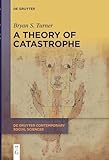A Theory of Catastrophe / Bryan S. Turner.
Material type: TextSeries: De Gruyter Contemporary Social Sciences ; 19Publisher: Berlin ; Boston : De Gruyter, [2023]Copyright date: ©2023Description: 1 online resource (V, 153 p.)Content type:
TextSeries: De Gruyter Contemporary Social Sciences ; 19Publisher: Berlin ; Boston : De Gruyter, [2023]Copyright date: ©2023Description: 1 online resource (V, 153 p.)Content type: - 9783110772234
- 9783110772449
- 9783110772364
- 363.348 23
- HV553 .T87 2023
- online - DeGruyter
- Issued also in print.
| Item type | Current library | Call number | URL | Status | Notes | Barcode | |
|---|---|---|---|---|---|---|---|
 eBook
eBook
|
Biblioteca "Angelicum" Pont. Univ. S.Tommaso d'Aquino Nuvola online | online - DeGruyter (Browse shelf(Opens below)) | Online access | Not for loan (Accesso limitato) | Accesso per gli utenti autorizzati / Access for authorized users | (dgr)9783110772364 |
Frontmatter -- Contents -- Chapter 1 Introduction: Disasters, Crises, and Catastrophes -- Chapter 2 Risk Society and Liquid Modernity -- Chapter 3 Enlightenment and Catastrophe -- Chapter 4 Plagues, Famines and Population -- Chapter 5 Colonial Catastrophes and Genocide -- Chapter 6 War: The Cascade of Catastrophes -- Chapter 7 The Economics of Catastrophe -- Chapter 8 Catastrophe and Utopian Hope -- References -- Index -- Erratum to: Chapter 7: The Economics of Catastrophe
restricted access online access with authorization star
http://purl.org/coar/access_right/c_16ec
Sociology has developed theories of social change in the fields of evolution, conflict and modernization, viewing modern society as essentially unstable and conflict driven. However, it has not seriously studied catastrophe. A Theory of Catastrophe develops a sociology of catastrophes, comparing natural, social and political causes and consequences, and the social theories that might offer explanations. A catastrophe is a general and systematic breakdown of social and political institutions resulting, among other things, in what we could call a catastrophe consciousness. The Greek ‘cata-strophe’ formed the conclusion to a dramatic sequence of strophes. The cata-strophe was the final act of a drama, namely its denouement. Catastrophic denouements are without hope: genocides, military occupations, plagues, famines and earthquakes. A Theory of Catastrophe analyzes Pompeii, the Black Death, colonial genocide in North America, WWI and the Spanish Flu, and Nazi Germany and finally this century: terrorism, new wars, climate change and pandemics. As a study of sociological theory, Bryan Turner discusses Spengler’s Decline of the West, Marxism as a theory of catastrophic capitalism, messianic movements, Weber on modernity, and risk society. He concludes by comparing optimism and pessimism, and the idea of inter-generational justice.
Issued also in print.
Mode of access: Internet via World Wide Web.
In English.
Description based on online resource; title from PDF title page (publisher's Web site, viewed 02. Jun 2024)


